‘GST ISSUES RELATING TO INTERMEDIARY’
The Indirect Tax Study Circle of the Bombay Chartered Accountants’ Society arranged its inaugural meeting on ‘GST Issues relating to Intermediary’ on 7th July which was addressed by Group Leader CA Yash Dhadda and Mentored by CA Udayan Chokshi.
CA Yash Dhadda made a detailed presentation on the law and issues relating to Intermediary Services under GST. The presentation broadly covered the following:
(1) Taxability under the erstwhile Service Tax regime;
(2) Definition and Place of Supply provisions under GST;
(3) Current outcome of writ petitions;
(4) Discussion on case studies covering various scenarios.
All the above issues were discussed at length. Mentor CA Udayan Chokshi explained the complexities involved in various scenarios and shared his views on the same. Important case studies and advance rulings were also discussed.
More than 150 participants benefited from the presentation shared by the duo of CA Yash and CA Udayan.
GST INTERPLAY – CUSTOMS, FTP & SEZ
The BCAS Indirect Tax Study Circle arranged a two-day meeting on ‘GST Interplay – Customs, FTP & SEZ’ on 31st July, and 10th August, 2021. It was addressed by Group Leader CA Rishabh Singhvi and Mentored by CA Prashant Deshpande.
CA Rishabh Singhvi made a detailed presentation on the concepts and parameters for differences and similarities between the various indirect tax laws, viz., Customs, GST, FTP and SEZ. Several case studies were drafted by the Group Leader and discussed at length by the participants. The following important issues were discussed:
(i) Merchant Trade,
(ii) EOU Unit Implications,
(iii) SEZ Unit Implications,
(iv) MOOWR Implications,
(v) Dual Incidence Implications,
(vi) Rule 96(10) issues, and
(vii) FTA Benefits.
Mentor CA Prashant Deshpande guided the group discussion at various stages and shared his expert views on the multiple tax issues involved. Important case studies and advance rulings were also taken up.
CA Jayesh Gogri had mentored and guided the Group Leader in drafting the presentation and the case studies.
The active participation of more than 80 members helped them to benefit from the group discussion.
DEPARTMENTAL AUDIT & ADJUDICATION PROCEDURES
The Indirect Tax Study Circle’s meeting on ‘Case Studies on Department Audit and Adjudication Procedures and Practical Issues’, which was held on 7th August, was addressed by Group Leader CA Keval Shah with CA Rajiv Luthia as Mentor.
Group leader CA Keval Shah had drafted detailed case studies for discussion which covered the following aspects in regard to Department Audit and Adjudication:
(a) Whether the scope of Departmental GST Audit can cover the period under Service Tax;
(b) Partial submission of data within time limit u/s 65(4) of the CGST Act, 2017;
(c) Interest on ineligible input credit availed but not utilised;
(d) Eligibility of ITC claimed in GSTR3B but not reflected in GSTR2A;
(e) GST on purchases from unregistered dealers;
(f) Payment of tax and interest demanded by audit team through utilisation of ITC; and
(g) Eligibility of ITC on delayed payment of GST under the RCM.
Mentor CA Rajiv Luthia guided the group discussion and shared his expert views on the multiple tax issues involved. Important case studies and advance rulings were also discussed. More than 60 participants benefited from the presentation.
SILVER JUBILEE ITF CONFERENCE
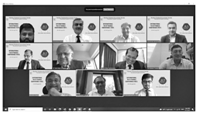
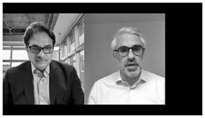
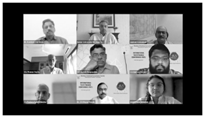
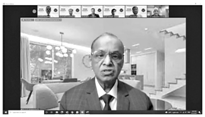
The Silver Jubilee International Tax and Finance (ITF) Conference, 2021 was conducted online from 12th to 16th August with a record attendance of 474 members from around 36 locations all over India. The total number of participants, including faculties and special invitees, crossed the 500-mark.
In keeping with the tradition of past ITF Conferences, this year’s Conference, too, was designed to include various contemporary and practically relevant topics for the international tax practitioner.
Eminent personalities and experts graced the Conference and shared their invaluable thoughts and experiences on their respective areas of expertise. The five-day Conference was marked by 13 technical sessions, including three group discussion papers, five presentations, three panel discussions (spread over four sessions) and one fire-side chat.
There were a total of 32 members on the faculty, including speakers and session chairmen, 29 group leaders and 19 contributors for case studies and the background material. It clocked over 35 hours of solid study during the Conference.
Facilitating Group Discussions: This year’s ITF had three papers for group discussion written by CA Pinakin Desai, CA Padamchand Khincha and CA Yogesh Thar. The participants were split into six, each group ably led by 29 group leaders (across the three papers) who helped generate in-depth discussion of the case studies from the papers. The paper writers could undertake a virtual tour of each group to follow the discussions by the participants.
Day 1: 12th August
President CA Abhay Mehta gave his opening remarks and explained the BCAS’s activities and its new initiatives. Chairman of the International Taxation Committee Dr. CA Mayur B. Nayak welcomed the participants and made the introductory remarks.
The Conference was inaugurated by the Past Chairman of the International Taxation Committee and the Chairman of the very first ITF Conference, CA Dilip J. Thakkar, with a welcome address. The President of the ICAI, CA Nihar Jambusaria, also addressed the participants. This being the Silver Jubilee Conference, CA Rashmin Sanghvi, Founding Member of the ITF study group, also spoke.
The Keynote Address was delivered by Padma Vibhushan N.R. Narayana Murthy on a very interesting and relevant topic – ‘The role of culture in improving governance in a company’. He laid stress on three key values, namely, ethics, transparency and honesty, for building a sound organisational culture and governance in a company.
As readers would be aware, investment and business activities have substantially increased in the Gujarat International Finance Tec-City (GIFT City) and various regulatory amendments have been made to enhance the lure of GIFT City – India’s first International Financial Services Centre (IFSC). On the first day of the Conference, Advocate Siddharth Shah dealt with ‘GIFT City IFSC – Regulatory and Tax Aspects of Investments and Transactions’ in great detail and explained various complex nuances to the participants. CA Vispi Patel chaired the session and also provided his insights on the subject.
Day 2 – 13th August
The day began with a group discussion on the paper written by CA Pinakin Desai on ‘Controversial Issues Arising from Tax Treaty Interpretation’.
CA Gautam Doshi spoke on ‘Structuring of Family Trusts – FEMA & Other Regulatory Aspects’. He covered various aspects of the subject in great detail, including conceptual explanations, legal and practical points for consideration, provisions of income-tax, FEMA, SEBI and even CRS regulations. Past President CA Dilip J. Thakkar chaired the session and also provided insights on the issues involved.
CA Pinakin Desai, dealing with his paper ‘Controversial Issues Arising from Tax Treaty Interpretation’, for over two and a half hours, highlighted in a detailed but succinct manner various issues such as possibility of access to tax treaty in light of general anti-avoidance rules (GAAR); principal purpose test (PPT) driven by MLI; simplified limitation of benefits provision (SLOB) driven by MLI; and certain select issues of treaty interpretation. Interestingly, CA Pinakin Desai was also a speaker and the Chairman of the International Taxation Committee at the 1st ITF Conference held in 1997 at the Manas Resorts, Igatpuri, Maharashtra. Past President CA Kishor Karia chaired the session and also gave his views on the subject.
The last session of the day was the panel discussion on ‘Experience and Developments in Transfer Pricing’. The panel consisted of CA Vijay Iyer, Dr. CA Hasnain Shroff and CA Kunj Vaidya and was chaired and Moderated by CA T.P. Ostwal.
The panel shared its thoughts and gave insights on specific issues in transfer pricing through case studies. The case studies covered practical issues which would be of relevance in today’s scenario, such as the Covid-19 impact on TP arrangements, APAs for service entities and profit attribution to PE, section 56(2)(X) and TP valuation, impact of secondary adjustment provisions, Covid-19 impact on the manufacturing sector and so on.
Day 3: 14th August
The proceedings started with a group discussion on the paper written by CA Padamchand Khincha on ‘Recent Developments in Taxation of Digital Economy in India’.
Dr. CA Anup Shah spoke on ‘Startups – Tax, FEMA & Regulatory Aspects’ covering various relevant issues such as registration and certification, funding options, exit options and new-age structures, SPACs, Externalisation of Investments and so on. Past President CA Chetan Shah chaired the session and set the ball rolling with his opening remarks.
CA Rashmin Sanghvi, speaking on ‘Future of International Tax Practice and Global Economy’, gave his perspective on the current status of the Indian regulatory system and international tax practice in India. He then described the background of the global events impacting international tax, especially the digital tax war, and provided guidance to professionals on the future of international tax practice. Past President CA Raman Jokhakar chaired the session and offered his perspectives on the topic.
Prior to the fireside chat and panel discussion on taxation of digitised economy, Advocate Mukesh Butani spoke succinctly on Pillar 1 and Pillar 2 of the OECD proposal in the context of taxation of the digitised economy.
In the fireside chat (recorded earlier) on ‘Global Developments in Taxation of Digitised Economy’ with Advocate Mukesh Butani, Mr. Pascal Saint-Amans, Director, Centre for Tax Policy and Administration, OECD, shared his thoughts and gave participants an insight into the potential future of taxation of the digitised economy and what one can expect in the near future. The chat was widely covered by the media in India as well as abroad.
Subsequently, there was a panel discussion on ‘Global Developments in Taxation of Digitised Economy’. The panel consisted of Mr. Carlos Protto, Director of International Tax Relations, Ministry of Economy, Argentina; Mr. Rajat Bansal, a senior IRS official and CCIT; and CA Radhakishan Rawal. It was chaired and Moderated by Advocate Mukesh Butani. The panel covered some of the nuances of the 2-Pillar approach agreed upon by the Inclusive Framework and also gave its views on the future of unilateral measures and Article 12B of the UN Model.
CA Padamchand Khincha, with his paper on ‘Recent Developments in Taxation of Digital Economy in India’, highlighted the various developments in India on the subject, including Significant Economic Presence (SEP), Equalisation Levy (EL), TDS provisions u/s 194-O and taxation of software in light of the recent Supreme Court judgment. Past President CA Rajan Vora chaired the session and gave his valuable inputs on the subject.
Day 4: 15th August
The day began with a group discussion on the paper written by CA Yogesh Thar on ‘Emerging issues in Cross-Border Personal Taxation’.
The first part of the panel discussion on ‘International Taxation – Recent and Emerging Issues and Developments in Law, MCs and Jurisprudence’, was held on Day 4. The panel consisted of Mr. Kamlesh Varshney, IRS and Joint Secretary (TPL) – Finance Ministry, Senior Advocate Ajay Vohra and CA Padamchand Khincha and was chaired and Moderated by CA Pranav Sayta. It was a unique and technically-rich discussion, as the panellists discussed issues from different perspectives.
The issues discussed covered a range of topics of relevance in today’s world – issues related to tax residence of individuals, the applicability of anti-abuse provisions, i.e., GAAR and PPT, availing benefit under the MFN Clause, withholding tax aspects in Multilateral Instrument (MLI), digital currency (classification of income and related issues), Covid-19-related taxation of foreign companies in India, and the term ‘Liable to tax’ and interpretation of Article 3(2).
The frank and thorough exchange of views among the panellists, ably supplemented by the Chairman’s probing queries, made the discussion very interesting and elaborate and provided a lot of food for thought to the participants. The panel discussion was based on case studies prepared by BCAS contributors who also presented their case studies to the participants.
CA Yogesh Thar, while dealing with his paper on ‘Emerging issues in Cross-Border Personal Taxation’, raised interesting points arising from recent developments in personal taxation due to amendments in section 6 relating to residence in India, and Covid-related issues in personal taxation. Past President CA Gautam Nayak chaired the session and also gave his inputs.
The day ended with a special programme, ‘Reminiscences of ITF Journey’ wherein the role of all past Chairmen, coordinators, speakers and contributors of the previous ITF Conferences was recognised, their experiences were relived and their efforts applauded – thus creating an emotional walk down memory lane for all participants. The programme was anchored by Dr. CA Mayur B. Nayak and CA Mayur B. Desai. It was well attended by past contributors and they shared memories of every Conference. CA Jagat Mehta prepared the presentation with details of past Conferences with photographs.
Day 5: 16th August
The second part of the panel discussion on ‘International Taxation – Recent and Emerging Issues and Developments in Law, MCs and Jurisprudence’ (already explained above) was held on Day 5. The frank and thorough exchange of views continued between the panellists, Mr. Kamlesh Varshney, IRS and Joint Secretary (TPL) – Finance Ministry, Senior Advocate Ajay Vohra and CA Padamchand Khincha, ably supplemented by Chairman CA Pranav Sayta’s probing queries.
CA S. Krishnan spoke on ‘Foreign Tax Credit – Practical Aspects and Experience with Case Studies’ covering various issues related to the topic and shared his rich, practical experience. CA Dinesh Kanabar chaired the session and also provided his insights.
Concluding remarks
While the personal touch and the camaraderie amongst participants during past physical Conferences were definitely missed, the participants were hugely enthused by the various sessions. This was the second consecutive ITF Conference held online, wherein delegates participated from their respective places – but thanks to the seamless connectivity, it was one of the most engaging and successful Conferences.
The Silver Jubilee ITF was held under the guidance of the Chairman of the International Taxation Committee Dr. CA Mayur Nayak. CA Abbas Jaorawala as the Chief Conference Director, ably assisted by CA Mahesh Nayak as Joint Conference Director, minutely supervised all the sessions personally and devoted a tremendous amount of time and effort to make it the resounding success that it turned out to be.
Other members of the core team were CA Ganesh Rajgopalan, CA Rutvik Sanghvi, CA Siddharth Banwat, CA Anil Doshi, CA Jagat Mehta, CA Natwar Thakrar, CA Tarunkumar Singhal and CA Rajesh P. Shah. Several others also made laudable contributions of time and effort to make the Conference a landmark event for the BCAS. It ended on a high note and received encouraging response and feedback from the participants.
Proceedings of the Conference can be viewed on YouTube at: https://www.youtube.com/watch?v=HWR2h3f0frg and also via the following QR Code:

‘LOCAL AND GLOBAL INVESTING’
The BCAS organised a lecture meeting by Mr. Kushal Thaker on ‘Evaluation of Stocks – New Economy vs. Old Economy – Local and Global Investing’ on 18th August.
It was planned with the aim of empowering professionals in understanding evaluation techniques and equipping them with the requisite knowledge as they set out on the road to becoming efficient business advisers.
President CA Abhay Mehta welcomed the participants and offered his remarks on the subject. CA Mihir Sheth introduced the speaker, Mr. Kushal Thaker, who is an astute trader and investor in commodities, equities and currency also known as ‘Specunomist’.
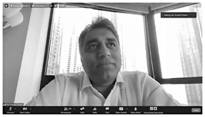
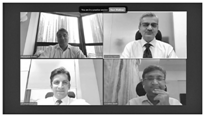
The speaker explained the concepts relating to various asset classes and their analysis.
Key issues and learnings of the meeting
1. New Economy vs. Old Economy
(a) New Economy: IT sector has experienced quantum leap from .com in 2000 to an apps-based life and now moving to Artificial Intelligence,
(b) Old Economy: Cement to Metal to Mining,
(c) Now, old economy is helping new economy companies by providing raw material and other products that act as inputs for new economy stocks,
(d) To analyse Electric Vehicle Companies, it is important to study the trend of commodities like copper, lithium and nickel. This can be extended to companies undertaking mining of these commodities.
2. Local and Global Investing
(e) Look at stocks beyond the Indian border. It’s likely that India may not have companies listed in that space,
(f) For example, global copper and lithium mining. There are no lithium mining companies listed in India. To take advantage of the upward trend in lithium, investing in global lithium mining would be beneficial.
(g) Never think in terms of defensive stocks. That comes only in a bear market. A bear market scenario in India is unlikely over the next decade.
3. Crude Oil
(h) As crude prices go up, investors usually look to buy oil-producing and oil marketing companies. It will be much better to have globally diversified companies in this space, as Indian companies are either government-controlled or in the small caps space.
4. E-commerce
(i) The pandemic acted as a tailwind for e-commerce. But then there were no e-commerce companies listed in India. Now we have Zomato. So, investing in global e-commerce is profitable as these companies have given mammoth returns during the last one year.
5. Key drivers of growth for the next decade
(j) High tech, new economy, old economy stocks – all supplemented new economy stocks,
(k) Hence one cannot see any bear cycle. Of course, corrections are likely, but only of approximately 10% to 20%, but not a bear market,
(l) A bull market is always going on somewhere in world. So it is not necessary stick to the Indian market,
(m) Be bullish on commodities – gold, silver, steel, rare earth or base metals, natural gas.
6. Beginners into International equity
(n) Internationally, ETF on FAANG returns is lower than the return generated by individual stocks,
(o) Direct investment through brokerage houses – Interactive brokers or Kotak Securities
7. Cryptocurrency
(p) Crypto is an asset class by itself. Each crypto has a role to play. Top 15 cryptos are worth reading against 800 cryptos being available for trading,
(q) SWIFT code is a messaging service between international banks and Indian banks for transfer of forex. SWIFT cannot move fast. But crypto is direct transfer of funds and very fast, too. Crypto-backed services are Ripple and Stellar,
(r) Some cryptos are moving into gaming and bond markets,
(s) India has 11 Crypto platforms and each has its own Crypto (currency). If there are more miners (of Cryptocurrencies), then volatility is going to be very high.
8. IPOs
(t) New IPOs in fintech and logistics companies are good,
(u) Investors should not hesitate from investing in high-growth loss-making companies as long as they don’t foresee any competition coming up in that space,
(v) Also, look into how management is planning for future growth. Many of these new e-commerce and fintech companies have global presence,
(w) If the company has good potential of going into Artificial Intelligence or becoming a Tech Company, supporting fast-growing companies can be considered as good potential investments.
The speaker, Mr. Kushal Thaker, also addressed the queries raised by the participants and shared his thoughts on evaluation techniques for stocks and commodities.
The meeting concluded with a vote of thanks proposed by CA Anand Bathiya to Mr. Kushal Thaker, who addressed the participants from his office in Chicago, USA.
The proceedings of the meeting are available on YouTube at:https://www.youtube.com/watch?v=UDBOMkHCN2E and also on the following QR Code:

‘MUMBAI’S COVID PANDEMIC MANAGEMENT MODEL’
The BCAS, along with the Dharma Bharti Mission and the Public Concern for Governance Trust, organised a lecture meeting in memory of the Late Shri Narayan Varma on ‘Mumbai’s Covid Pandemic Management Model’ on 24th August. It was addressed by Mr. Iqbal Singh Chahal, IAS and Commissioner of the BMC. It was held through virtual mode on Zoom platform with live-streaming on YouTube.
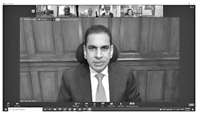
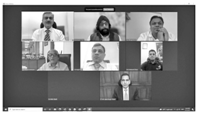
Ms. Farheen Peshimam started the proceedings and shared a video containing fond memories of the late Shri Narayan Varma with the three associations. She also read a message from the Late Shri Narayan Varma’s Family.
Mr. Paramjeet Singh, President of the Dharma Bharti Mission, delivered the welcome address. He also welcomed the keynote speaker and the three awardees. He gave an insight into the various initiatives taken and the contributions made by the Late Shri Narayan Varma during his lifetime and the impact he made on society and the three organisations at large. Ms Farheen Peshimam then formally introduced Mr. Iqbal Singh Chahal.
Mr. Chahal started by describing the scenario under which he had taken charge of the BMC on 8th May, 2020. Since then, innumerable initiatives had been taken by him and the BMC during the pandemic; he summarised these as follows:
• Systems were created to fight the long war against Covid-19. The model that was created had 27 sub-models to fight the pandemic;
• The model was implemented by dividing Mumbai into 24 war rooms with a real-time dashboard of the Covid-19 cases;
• The approach was a combination of proactive and offensive steps to contain the pandemic at the very start;
• Containment zones were created to chase the virus;
• Sanitization drives were conducted to break the chain of the virus and prevent the multiplication of cases;
• Appointing community leaders in slum areas so as to achieve better coordination;
• Increase spending by BMC on the medical infrastructure and addition of 800 ambulances to fight the virus;
• Distribution of free PPE kits to doctors and medical practitioners;
• A Covid dashboard was created with public and private hospitals and all the reports were managed by a BMC-appointed team of doctors;
• Hospital beds were allotted on the basis of social equality, thereby avoiding a chaotic or panic situation of patients running from one hospital to another;
• Creation of seven Jumbo centres in various parts of the city which were converted into full-fledged greenfield hospitals in record time under the mentorship of top doctors;
• Private hospitals helped by agreeing to cap the rates of beds and other medical facilities which made this a successful public-private partnership;
• Pre-emptive stocking of life-saving medicines at the onset of the second wave proved to be crucial to successfully manage and control the second wave;
• Various campaigns run by BMC to fight Covid-19, like ‘My family, My responsibility’ and ‘No Mask No entry’ to create awareness among the people;
• Initiatives taken to avoid any major mishaps during the oxygen crisis in the second Covid-19 wave and the cyclone faced by Mumbai in the month of May, 2021.
Mr. Chahal shared that the speed of vaccination was quite steady and if this continued, then Mumbai would be spared any major third wave that was likely to hit in October-November, 2021. He lauded the contribution of various NGOs in distribution of food packets and other initiatives. He also responded to the questions from the participants before concluding his session.
To summarise Mr. Chahal’s address, he made some important statements:
1. Let us not be demoralised,
2. We have been chosen by God and given this opportunity to serve humanity,
3. Systems will fight the pandemic and not the individuals, and
4. We have to chase the virus in an offensive manner.
Following this excellent talk, the three Narayan Varma Memorial Awards were announced.
1. The first awardee was Advocate Maharshi Dave, Founder of Sparsh Trust. This Trust was initially founded to help stray dogs in the city, but its principles led them to expand their efforts towards helping both animals and humans.
Giving a brief talk, Mr. Dave emphasised that the foundation believed in the concept of service and empathy. It believed that the more one gave, the more one got. ‘The platform provided by this event is very important for the Trust as it helps in spreading the word about the services that we can provide to many more in need,’ he added.
2. The next awardee was Shri Ravi Singh, Founder of Khalsa Aid International. This is a UK-based humanitarian relief charity that provides aid to people affected by various natural as well as man-made disasters. Even in this pandemic, it was at the forefront and donated planeloads of oxygen cylinders and oxygen concentrators to all parts of India and the world.
3. The third and final awardee was Mr. Ranga Rao, who retired as Assistant Director in the Intelligence Bureau in January, 2010 after 39 years of service. The Late Shri Narayan Varma had encouraged Mr. Rao to learn how to use RTI. Soon, Mr. Rao had started filing RTI applications to address the grievances brought to his attention by poor citizens. The success rates of these applications encouraged his group to start a programme which focused on spreading awareness about the use of RTI to help resolve several issues. Since 2013, Mr. Rao has taught more than 2,000 students all over India the use of the RTI Act to fight corruption.
The meeting ended with a vote of thanks to Mr. Iqbal Singh Chahal proposed by BCAS President CA Abhay Mehta, who officially concluded the meeting.
The lecture is available on YouTube at https://www.youtube.com/watch?v=IgaLf8rqvZs and via QR Code

‘GDP & ECONOMIC ANALYSIS – PERSPECTIVE AND IMPORTANCE FOR CAS’
A lecture meeting was organised by the BCAS on ‘GDP & Economic Analysis – Perspective and Importance for CAs’. It was delivered by CA Raj Mullick on 25th August.
.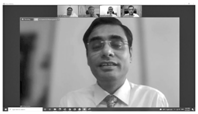
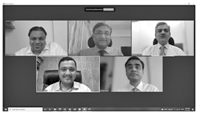
The lecture was designed with the aim of empowering professionals in understanding and interpreting economic data and economic indicators, to broaden the horizon for advising and enabling professionals in taking a more holistic view about the way businesses are carried out, and their overall impact on the country at large.
President CA Abhay Mehta welcomed the participants and shared his views on the topic under discussion. CA Chirag Doshi introduced the speaker.
The speaker, CA Raj Mullick, made a detailed presentation on the concepts relating to Gross Domestic Product (GDP) and its analysis. The presentation broadly covered the following:
1. Economy during the pandemic,
2. Micro- and macro-economics,
3. Economy’s income and expenditure,
4. What is GDP?
5. GDP components – (Consumption, Investment, Government spending, Net exports),
6. Real vs. nominal GDP,
7. GDP indicators,
8. Limitation of GDP as a measure of a nation’s well-being,
9. International differences in GDP and quality of life,
10. Saving and investment in national income accounts,
11. Impact of pandemic on the GDP,
12. GDP – Current India @ 2021,
13. GST indicators,
14. Role of Chartered Accountants.
CA Raj Mullick made extensive use of charts, circular flow diagrams and graphics to explain the concept of GDP and so on. He also conducted a quick check of the understanding of the participants by posing practical case studies and eliciting responses on the impact of various situations on the GDP.
The participants took active part by sharing their views on the questions and case studies posed by the speaker. More than 100 persons benefited from the presentation shared by him.
CA Mrinal Mehta proposed the vote of thanks.
The lecture is available on YouTube at https://www.youtube.com/watch?v=_bVuE73LaEk and also via QR code:

AMENDMENTS IN INCOME-TAX ACT, 1961
The Students’ Forum, under the auspices of the BCAS HRD Committee, organised a training session for CA Article Students on ‘Changes in Income-tax Forms and Corresponding Amendments in the Income-tax Act, 1961 for Individuals and HUFs’ on 30th August.
The Study Circle was led by CA Utsav Shah and CA Viren Doshi who are experts on the subject. CA Khubi Shah, the coordinator, introduced the speakers and spoke about the various activities and events conducted by the BCAS Students’ Forum. He encouraged students to actively participate in the events organised by the Forum.
The speakers covered the return-filing process right from the beginning and described in detail the filing of returns on the newly-launched portal using the new utilities introduced. They discussed in detail the section-wise and clause-wise changes and corresponding changes in the return format.
CA Utsav and CA Viren also covered the detailed process and utility walkthrough and guided the students on filing various sections of the form and precautions to be taken to avoid validation error, defective return and demand u/s 143(1). A return-filing checklist was also provided for the benefit of the students.
The session ended with CA Dnyanesh Patade, coordinator, proposing the vote of thanks both to the speakers and to the participants. Around 100 students participated in the interactive session and their feedback was very positive.
The entire session can be viewed on the BCAS YouTube channel at ‘Training Session for CA Article Students – YouTube’ and also via the following QR Code:

TREE PLANTATION & EYE CAMP PROJECT 2021
After a gap of one year because of the Covid-19 pandemic, it was time to continue with the decade-old legacy of contributing to the upliftment of tribals and needy persons. The current pandemic has taught us the importance of oxygen, immunity and healthcare.
The HRD Committee under the aegis of the BCAS Foundation organised a two-day visit to Dharampur and Vansda on 25th and 26th September with the objective of caring for nature by planting trees, to provide primary healthcare and quality education to the tribal population, and to help in reaching out to the hitherto neglected people and provide them with timely treatment of cataracts. Thanks to the generosity of our esteemed donors, the BCAS contributed Rs. 7,00,000 for these noble causes.
In view of the current scenario of Covid, a small group of 21 volunteers, representing BCAS on behalf of the donors, got together for the symbolic tree plantation and attended the eye camp. It also visited three NGOs active in the remote villages.
(1) Sarvodaya Parivar Trust (SPT). The group reached Pindval-Dharampur to visit the SPT centre. The trust implements the vision of Acharya Vinoba Bhave of unconditional service to tribals. It works in the fields of environment, education and water conservation and follows a holistic approach for poverty alleviation based on Gandhian principles. The BCAS group interacted with the trustees and volunteers. It also met the children studying at the centre, interacted with them and distributed sweets. The group, along with a team of local farmers, conducted symbolic tree plantation in the fields. It planted mango and bamboo saplings. The BCAS Foundation contributed Rs. 3 lakhs for the plantation of 10,000 trees. Sujataben told them about the activities being conducted by the trust in 35 nearby villages and the challenges faced by them in doing the same. She also explained the outcome of the activities which impacted the life of thousands of residents of the hilly region.
(2) ARCH – Action Research in Community Health, Nagaria. ARCH was founded by the Late Dr. Daxaben Patel to provide basic preventive, curative and maternal-child health services. The Managing Trustees are Mr. Rashmibhai and Mr. Sudarshan Iyengar, former Vice-Chancellor of Gujarat Vidyapeeth and a leading scholar on Gandhian studies. They and their young and passionate associates took the BCAS team through various innovative teaching techniques for students and their skill development programme, as also the new water-saving techniques used in the plantation. ARCH also conducts mobile health camps in inaccessible villages. The BCAS contributed Rs. 1,50,000 for the triple purposes of tree plantation, skill development and children’s education.
(3) Dhanvantari Trust – Sant Ranchhoddas Eye Hospital Vansda. This body runs an eye hospital which provides free cataract operations and other kinds of eye care for the indigent people. Ghanshyambhai and other trustees described the contribution of the founder trustee, the Late Dr. Kanubhai, in pioneering a 100-bed hospital and that has conducted over 60,000 eye operations with the support of doctors and volunteers who identify patients and arrange for their treatment at Vansda. He explained how ignorance about eye problems because of extreme poverty, misconceptions and so on, result in blindness among the poor. The trustees also talked about the future plans of bettering the facilities, services and upgrading the equipment. The BCAS Foundation contributed Rs. 2,50,000 for the eye camp which performed 250 cataract operations.
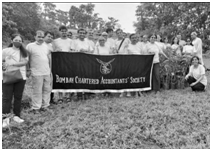
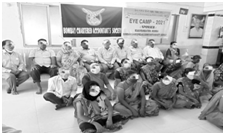
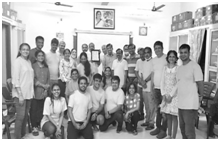
It was a touching experience to see the devotion and selfless service by volunteers for upliftment of the tribal society. All the participants and Trustees expressed their thanks to BCAS for organising the visit to the project sites.





























